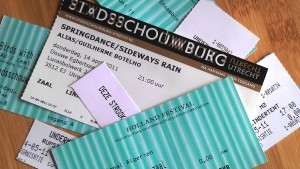An eye on communication
Communication is everything: in the world of culture, just as everywhere else. Yet it does not always happen on its own. Seemingly opposing interests, different cultures, new legislation and regulation or organisational growth are all potential areas of conflict or friction.
At TOT, Marijcke Voorsluijs combines her industrial psychology expertise with more than 20 years of work experience in the cultural sector. She has resolved many issues for her clients, either on her own or in collaboration with other specialists in her network. » read on about Project management
The time clock
Associations with the factory from Modern Times come to mind when thinking about the time clock. Although the punch card is replaced with a pass or badge, the principle remains the same: each staff member starting work signs in, and those who have finished work sign out. Nowadays, instead of a clock there’s a terminal where you can find your holiday entitlement, register visits to the doctor or report as working offsite. » read on about Time tracking
Cold, hard cash

Where is the money earned? At the box office! Visitors buy tickets for events, exhibitions, performances or concerts. And nowadays you will not find an amiable employee behind a cashbox with a notebook. Instead, they sit behind the computer, ask for the postal code and house number, enter the number of tickets, click Print and make payment. Whether it is online or at the box office, in cash or by bank transfer, all sales run through the same computer program. » read on about Ticket sales

Many cultural organisations do not use a CRM program. At least, that is what they think. They dabble in CRM but do not have a specific program for it, which is not always necessary. You can do more with Outlook than you think. Excel is great for maintaining addresses and removing duplicates. Nearly every event scheduling or ticket sale program has a CRM option. If this is enough for you, do not let yourself be talked into getting a separate CRM package, as slick as it may seem. Why buy an expensive program when the software you have already fits the bill? » read on about CRM
Cultural organisations can no longer do without private financing. Crowd funding is hot, but organisations still seek ways to recruit sponsors, donors and friends.

That entails all kinds of activities:
- Finding potential donors;
- Keeping a record of who has been approached, when and how;
- Determining who has reacted to a mail or telephone campaign;
- Registering donations, and receiving and checking payments;
- Sending annual reminders and thank yous for gifts received.
- If you have a limited number of sponsors and donors or a tight-knit group run by volunteers, Excel is the perfect tool for recording addresses and donations.
However, you could also purchase a program for this purpose. » read on about Fundraising

Contemporary performing arts in historic buildings
These are two magnificent renovated and restored buildings in the centre of Haarlem. The Philharmonie, the concert hall in Haarlem, can be found behind the Grote Markt, while the Stadsschouwburg is located on the Wilsonsplein, and was reopened by Princess Máxima in September 2008 after extensive renovations. » read on about Stadsschouwburg & Philharmonie Haarlem

Renowned theatre
Stadsschouwburg Amsterdam was, and still is, the most important theatre in the Netherlands. Not only do famous (international) performances première here, but the Stadsschouwburg also presents leading festivals, including Julidans and the Holland Festival. » read on about Stadsschouwburg Amsterdam


